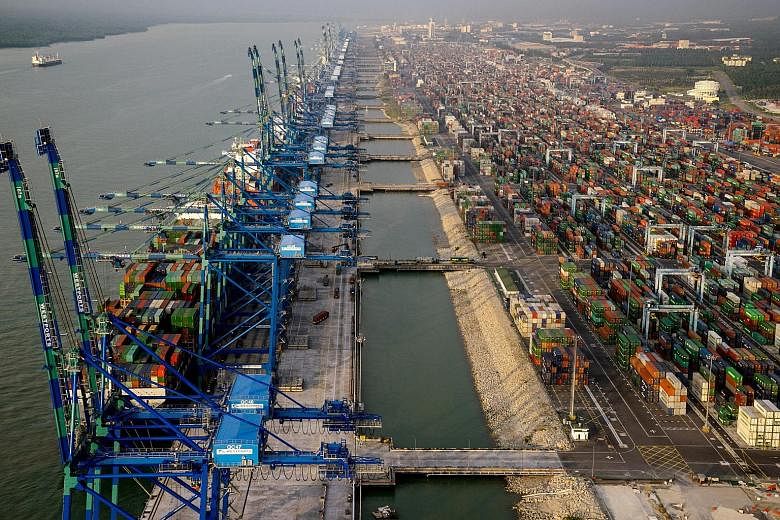Business at Malaysia's main shipping hub in Port Klang has taken a hit this year as major shipping companies shift their operations to Singapore under new alliance agreements, industry officials say.
This has raised questions over the aggressive plans by Kuala Lumpur to build new harbours and rail links along the Strait of Malacca, one of the world's busiest maritime trade routes.
Many of these are partnerships with Beijing, yet the Ocean Alliance - which includes state-owned China Cosco Shipping, the world's fourth-largest player - made a huge shift from Klang to PSA Singapore's terminal in April. The Straits Times understands that this has added to concerns in the industry over China's commitment to supporting the logistics industry in Malaysia.
Beijing and Kuala Lumpur had been talking up joint transport infrastructure in Malaysia, such as last month's launch of the RM55 billion (S$17.6 billion) East Coast Rail Link to be built and financed by China. The project will link Port Klang to Kuantan Port which faces the South China Sea, in what Prime Minister Najib Razak called an "alternative trade route" to Singapore.
"Only Kuantan Port has Chinese equity so far because it also aids Beijing's South China Sea claims. Other infrastructure plans have either not taken off or are only loans, or worse, just Chinese companies winning construction deals," former Port Klang Authority chairman Lee Hwa Beng told The Straits Times.
Data compiled from Northport and Westports, the two operators in Klang, showed that after nearly four years of increasing loads, cargo throughput was down a sharp 8.4 per cent in the second quarter of this year to 3 million twenty-foot equivalent units (TEU). This followed a flat first quarter of 0.9 per cent growth.
Westports, which controls three- quarters of Klang's total capacity, "is now conservatively guiding 2017 volume may decline 7-12 per cent", and next year's prospects remain "murky", according to UOB-Kay Hian's analyst Kong Ho Meng.
-
8.4%
Fall in cargo throughput in the second quarter of this year - to 3 million TEU.
0.9 %
Flat first-quarter growth.
The new alliance agreements' biggest impact on Klang was the loss of transshipment volumes - goods stored before being shipped to their final destination - from giants United Arab Shipping Company (UASC) and France's CMA CGM. This could total up to 2 million TEU annually. UASC has now merged with Germany's Hapag-Lloyd, making it part of THE Alliance, while CMA CGM is the biggest company in the rival Ocean Alliance.
Both groups, which handle nearly half the world's shipping capacity, started realigning in April, resulting in more than half of Klang's Asia-Europe calls being shifted to Singapore, said industry officials.
CMA CGM and Cosco have naturally gravitated to Singapore as both have major investments there. PSA saw a 9.6 per cent jump in the second quarter to 8.5 million TEU.
Among the world's top 20 ports, Klang was one of only two, the other being Tanjung Pelepas on the south coast of Johor, to see a drop in volume in the first half of this year.
The slowdown added to concerns of oversupply due to plans for new China-backed megaports like the RM43 billion Melaka Gateway and on Carey Island, which sits just off Klang. Both government and industry sources told The Straits Times that Chinese companies earmarked to take a stake in these two projects have had reservations over their viability. The planned port for Carey Island now has an Indian partner, with its mooted valued halved to RM100 billion.
Surprisingly, the government last month gave Westports permission to double its capacity to 30 million TEU - which is as much as what PSA handled last year - despite its volume shrinking in the year to date.
"We are still unsure of the need for the group to expand its capacity to the level mentioned as the talk of a third port in Klang is gaining traction," said Hong Leong Investment Bank's analyst Lim Sin Kiat.
Still, the Malaysian government is insisting that cargo volumes are set to rise as the country strengthens connectivity with southern Thailand and Sumatra across the Strait of Malacca.
"Only the transshipment volume came down a bit but our local volume increased. We can see a strong growth in Malaysia, especially our economic production," Transport Minister Liow Tiong Lai said last Monday. He added that "we have a very good relationship" with Cosco, which is "confident about Malaysia", and played down as an "internal working operations issue" the fast-expanding firm's investment in container berths in Singapore.

